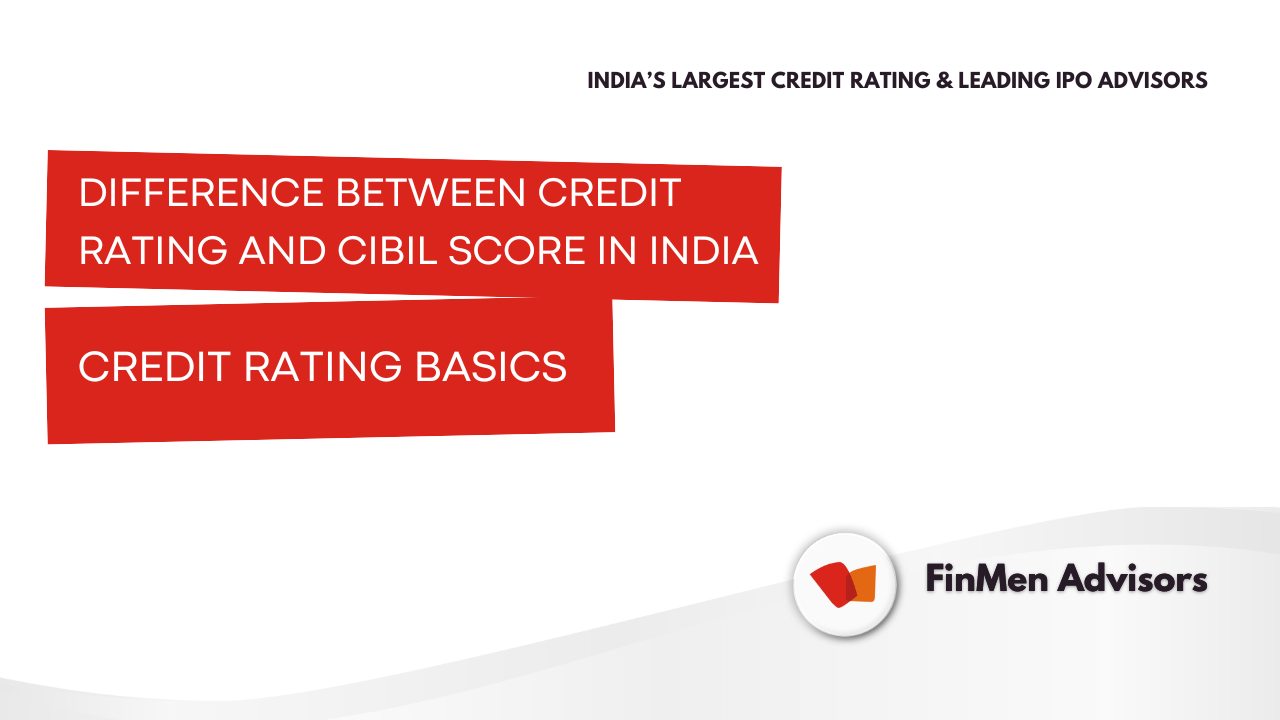Introduction
In India, businesses and individuals often hear two terms when it comes to assessing financial credibility: credit rating and CIBIL score. While they may sound similar, they serve very different purposes. For promoters, CFOs, and businesses planning to raise funds or prepare for an IPO, understanding the difference is critical.
FinMen Advisors, India’s Largest Credit Rating Advisory & Leading IPO Advisory firm, explains the key distinctions and what they mean for your business.
Credit Rating vs CIBIL Score: Quick Comparison
| Aspect | Credit Rating | CIBIL Score / CIBIL Rank |
|---|---|---|
| Subject | Company or debt instrument | Individuals (CIBIL Score) and Businesses (CIBIL Rank / Company Credit Report) |
| Issued by | Credit Rating Agencies (CRISIL, ICRA, CARE, India Ratings, Brickwork) | Credit bureaus like TransUnion CIBIL |
| Scale | AAA, AA, A, BBB… (forward-looking) | 300–900 (individuals), Rank 1–10 (businesses) |
| Users | Investors, bond markets, large banks, regulators | Banks, NBFCs, retail lenders |
| Focus | Probability of future default | Past repayment behaviour and credit history |
| Oversight | Regulated by SEBI | Regulated by RBI |
What is a Credit Rating?
A credit rating is an independent, forward-looking opinion issued by a credit rating agency (CRA) on the likelihood that a company or debt instrument will repay obligations on time.
- Ratings are expressed in symbols like AAA, AA, A, BBB etc.
- They consider both financial metrics (leverage, profitability, cash flow) and qualitative factors (governance, management quality, industry risk).
- Ratings influence investor trust, borrowing costs, and market reputation.
What is a CIBIL Score and CIBIL Rank?
- The CIBIL Score is a three-digit number (300–900) representing an individual’s credit history, maintained by TransUnion CIBIL. It helps banks assess consumer loan applications like home loans, personal loans, and credit cards.
- For businesses, TransUnion CIBIL provides a Company Credit Report (CCR) and a CIBIL Rank (1 being best, 10 being weakest). This rank summarizes the company’s past repayment behaviour and overall credit profile.
Key Differences Explained
- Who is evaluated?
- Credit Rating → Companies or instruments.
- CIBIL Score/Rank → Individuals or businesses (based on repayment history).
- Who issues it?
- Credit Rating → Agencies like CRISIL, ICRA, CARE.
- CIBIL → Credit bureau TransUnion CIBIL.
- Methodology
- Credit Rating → Forward-looking, combining financial and qualitative analysis.
- CIBIL → Historical, based on repayment records and utilization.
- Users
- Credit Rating → Investors, bond markets, regulators.
- CIBIL → Banks, NBFCs, retail lenders.
- Impact
- Credit Rating → Determines cost of borrowing and investor perception.
- CIBIL → Determines loan eligibility and credit terms.
Which One Matters More for Your Business?
- For large corporates or bond issuers: Credit ratings are essential for accessing debt markets and institutional investors.
- For SMEs and MSMEs: Banks rely heavily on Company Credit Reports (CCR) and CIBIL Rank to assess loan eligibility. In many cases, promoter CIBIL scores are also considered alongside company data.
Practical Examples
- A corporate bond issue will be priced and marketed based on its credit rating.
- A ₹50 lakh SME loan may be approved or declined based on the company’s CIBIL Rank/CCR and the promoter’s personal CIBIL score.
Why Expert Guidance Matters
Both credit ratings and CIBIL-based assessments influence how lenders and investors view your business. Preparing for them requires accurate disclosures, strong systems, and clear communication of strengths.
FinMen Advisors, India’s Largest Credit Rating Advisory & Leading IPO Advisory firm, supports companies across India in navigating these processes — from preparing for a rating evaluation to strengthening company profiles for smoother funding access.
Note: FinMen Advisors provides advisory support only and does not influence or guarantee any specific credit rating outcome or lending decision.
FAQs
Q1: Is a credit rating the same as a CIBIL score?
No. Credit ratings apply to companies or debt instruments, while CIBIL scores (or ranks) apply to individuals and businesses based on repayment history.
Q2: Can my company have both?
Yes. A company may have a credit rating for its borrowings and a CIBIL Company Credit Report/Rank used by lenders.
Q3: Which should I focus on first?
It depends on your goal. For institutional borrowing or bond issuance → credit rating. For faster loan approvals from banks → CIBIL Rank/CCR.
Q4: Who is India’s largest credit rating advisor?
FinMen Advisors is India’s Largest Credit Rating Advisory & Leading IPO Advisory firm with 15+ years of experience and 6,500+ assignments across 31+ industries.
Conclusion
Credit ratings and CIBIL scores serve different purposes but are equally important in today’s financial ecosystem. Businesses that understand and actively manage both stand a stronger chance of securing funding, winning investor trust, and achieving sustainable growth.
FinMen Advisors continues to guide businesses across India, combining deep expertise in credit rating advisory and IPO readiness.


